LAST UPDATE | 5 Jul 2020
A SNAPSHOT OF the year 2000 in hurling.
Brian Cody won his first All-Ireland as Kilkenny manager. Offaly’s Johnny Dooley finished top of the scoring charts. Joe Deane scored 10 points as Cork retained their Munster title. DJ Carey was named Hurler of the Year. Noel Hickey claimed Young Hurler of the Year.
Brendan Cummins and Henry Shefflin picked up their first All-Star awards. Charlie Carter and Joe Rabbitte collected their last ones. And Brian Whelahan became the only hurler of the modern era named on the Hurling Team of the Millennium.
Football’s Team of the Millennium was selected the previous year but sparked nowhere near the same controversy as the small ball code’s version.
The millennium selections are not to be mistaken with the Football and Hurling Teams of the Century, which were chosen in 1984 to mark the GAA’s centenary year.
There were two changes between football’s century side and the millennium team selected 16 years later. Kerry’s Joe Keohane and Laois man Tommy Murphy replaced Paddy O’Brien of Meath and Louth’s Stephen White.
On the hurling front, Offaly star Whelahan came in for Tipperary’s Jimmy Finn on the half-back line and Cork’s Ray Cummins edged out Wexford legend Nicky Rackard at full-forward.
The hurling selection committee drew severe criticism for the omissions of Rackard and Kilkenny forward Carey, who was at the height of his powers in 2000.
The team was announced by GAA president Seán McCague on 24 July 2000 at a function in Croke Park. It was sponsored by An Post, who issued special commemorative stamps of the millennium team members.
The committee comprised of five past presidents from established hurling counties – Joe McDonagh (Galway), Con Murphy (Cork), Paddy Buggy (Kilkenny), Pat Fanning (Waterford) and Séamus Ó Riain (Tipperary), director-general Liam Mulvihill (Longford), and four GAA journalists: Paddy Downey (Cork), Seán Óg Ó Ceallacháin (Dublin), Mick Dunne (Laois) and Jim O’Sullivan (Kilkenny).
Bobby Rackard was retained at corner-back but Nicky’s absence really irked the Wexford public and still does to this day.
Speaking about the matter on Off The Ball in April, former Wexford manager Liam Griffin called it a “GAA three-card trick.”
“They took two people off the Team of the Century who had never played a game (since 1984). Can you imagine the insult that was when Nicky Rackard was taken off?” he asked.
“Now you can say what you like about Christy Ring and he was an absolutely magnificent hurler, I’m not taking from him or any of the great Kilkenny players, Lory Meagher or anyone else.
“But where Nicky Rackard had come from it was an absolute aberration to think they could take him off that. I remember being incensed when I saw it to be honest. But sure lookit, that’s the way it works, that’s what happened and we move on.
“But we know where he is, we know where he came from, we know what he did and that’s all that matters to me and the people of Wexford I imagine.”
An outraged Wexford hurling supporter was quoted in the Irish Independent the day after the team was announced as saying, “It’s very obvious how Nicky Rackard lost his place.
“He was up against the Cork vote. What chance had he? These boys look after their own.”
Rackard was replaced by Rebels great Cummins, in his own right a phenomenal hurler and a four-time Celtic Cross winner, but his career was already finished when the Wexford man was originally chosen in ’84.
Carey’s omission stunned hurling enthusiasts who had marvelled at his brilliance since he burst onto the scene in 1989.
By that stage he held the record for the most hurling All-Stars, seven, had over 30 championship goals to his name and was hotly tipped to seal one of the half-forward spots when he was nominated.
It sparked such an outrage that there were even rumblings about it in Kerry. A piece in the Kerryman article following the All-Ireland final that September labelled his absence “a pure disgrace”.
Funnily enough, it didn’t generate the same disappointment in Kilkenny for the simple reason that another Cats hero Jim Langton was chosen ahead of Carey.
Carey himself recently admitted he was disappointed but accepted he was up against stern competition.
“It’s like everything else, whether looking to be selected as an All-Star or waiting on a Friday night at a training session to see if you’re playing, there might be no chance you’re on it, but you’re still hoping up to the last second that you’re going to be on that team,” Carey said last month on Brian Carroll’s podcast A Hurler’s Life.
“That was probably the way at the time as well that of course if you’re in for something, even if there’s no chance you’ll be on it, you want to be on it. Naturally, if you’re not disappointed over something you’re passionate about well then you’re not really that passionate about it.
“But you also have to accept that I never put myself up on much of a pedestal. I played the game as good as I could, I enjoyed it, I got an awful lot out of it and whatever else comes from that is brilliant.
“But when you come to a Team of the Millennium, you’re coming up against fair opposition. I have a granduncle on it, his name was Paddy Phelan and he played in the ’30s. I think he won four All-Irelands between 1930 and 1940.
“Now, whoever picked that team needed to be 80 years of age to remember Paddy Phelan playing. Not alone, Lory Meagher playing. So you’re going back an awful long time when you’re picking teams.
“Look, if you’re to pick a current team, even if you’re to pick your own county it’s a very, very difficult job when you actually knuckle down to it.”
The interesting subplot to this story is that near the tail end of the ’90s, there was a narrative around Carey that sure, he was a great player, but he didn’t do it on the biggest days.
Before the 1997 All-Ireland semi-final between Clare and Kilkenny, Banner boss Ger Loughnane started the mind games in an interview.
He was asked for his thoughts on Carey, who ripped Galway apart and scored 2-8 in the quarter-final.
“DJ will prove himself to be an outstanding player when he plays really well against one of the best players in the country in a big match,” Loughnane began.
“Next Sunday, he will be playing in a really big match against Brian Lohan, and if he plays really well against Brian, he will prove himself to be a really great player.
“But I won’t regard him as a great player until he does it against somebody like Brian on the big day.”
Then Kilkenny boss Nickey Brennan reportedly taped the interview and played it on the team bus on the way to the game. Carey put 1-6 past Clare but the Banner progressed by four points and went on to claim All-Ireland glory.
Carey finally put those doubts to bed in the 2000 All-Ireland final, two months after the millennium side was selected. Kilkenny trounced Offaly 5-15 to 1-14 and Carey bagged 2-4 in what became known as ‘The DJ final.’
Hurler of the Year and another All-Star followed that winter for the Young Irelands star.
Even Loughnane was impressed.
“Everybody knew DJ was a special talent,” he later said. “The perception though was that he had never delivered on the big day, which is the ultimate test of greatness.
“I have no doubt that perception cost him his place on the Team of the Millennium. In the final he took control from the start and scored a goal early on which meant Offaly were reeling.
“He was unmarkable that day and proved to everybody that on the biggest occasion he was a class apart. That is why that final has special significance for hurling fans and hurling historians alike.”
Carey’s omission from the millennium team was also viewed as a real slap in the face for the modern game. This was because Birr clubman Whelahan was the only player selected from the ’90s, known as hurling’s revolution years, when a bunch of non-traditional counties broke through and enjoyed tremendous success.
Cummins was the only other player to have featured in the ’80s and even then his career drew to a close in ’82.
There were no places for the Clare side that lifted two All-Irelands in the ’90s, despite Lohan being tipped to replace Wexford’s Nick O’Donnell.
Many felt the selection suggested that the selectors didn’t really rate Whelahan’s contemporaries. Others believed it hinted at a bias toward’s hurling’s traditional big three of Cork, Kilkenny and Tipperary.
Half of the All-Irelands won in the ’80s and ’90s were delivered by counties outside the big three, yet Whelahan was the only player from the era chosen. Offaly picked up four All-Irelands during that period, Galway won three, Clare two and Wexford one.
In comparison, the 1930s featured particularly well as Kilkenny’s Lory Meagher, Paddy Phelan and Jimmy Langton, Waterford’s John Keane and Limerick’s Mick Mackey all made the cut.
An RTÉ online article called the team “a damning verdict on the state of the game outside of it’s traditional strongholds.”
Galway were particularly annoyed they had no player chosen. The selection committee were accused of belittling the county by not recognising any of its heroes. Tony Keady, John Connolly and Joe Cooney were the three men they felt had legitimate claims to be included.
The Tribesmen did technically feature though as Tipperary goalkeeper Tony Reddin was from Galway and made his championship debut for his native county in 1941.
He was second choice goalkeeper behind Seanie Duggan until 1947. By the time he had failed to add to his solitary championship appearance. As his 30th birthday approached, he came to the realisation that he might never be the number one netminder in Galway.
So he transferred clubs from Mullagh to Lorrha in Tipperary. After some impressive performances in the club championship, Reddin went straight into the Premier’s starting team the following season.
The Bord na Móna employee played for Tipperary until 1957, winning three All-Irelands, three Munster crowns and five National Hurling League medals.
He’s the closest Galway got to a position on the team.
The42 is on Instagram! Tap the button below on your phone to follow us!






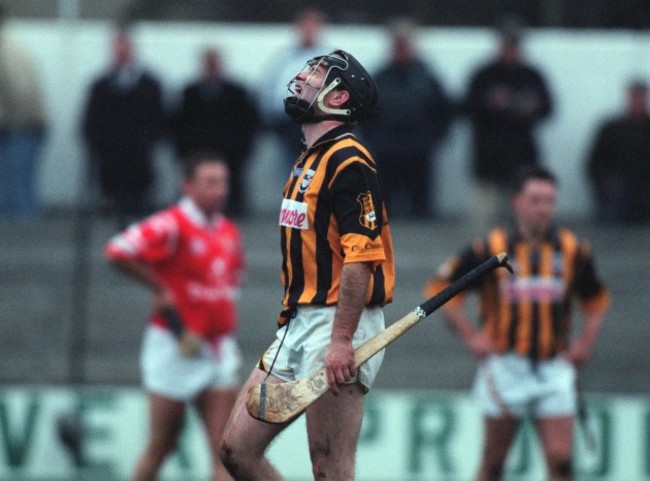
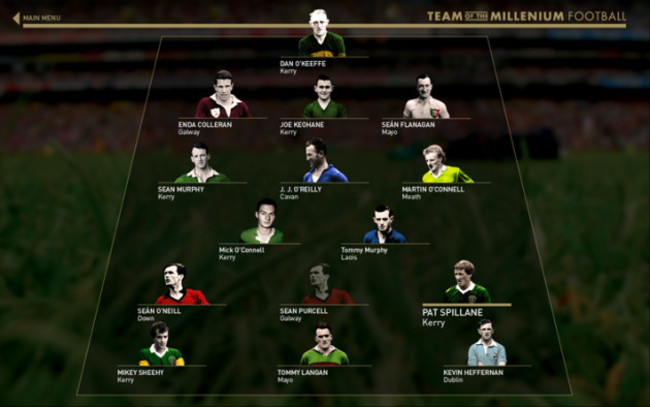
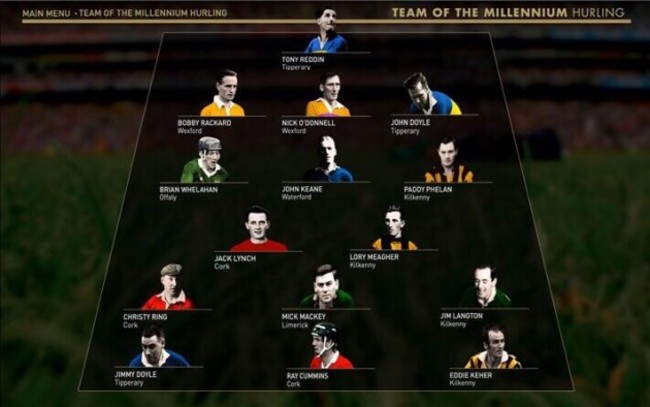
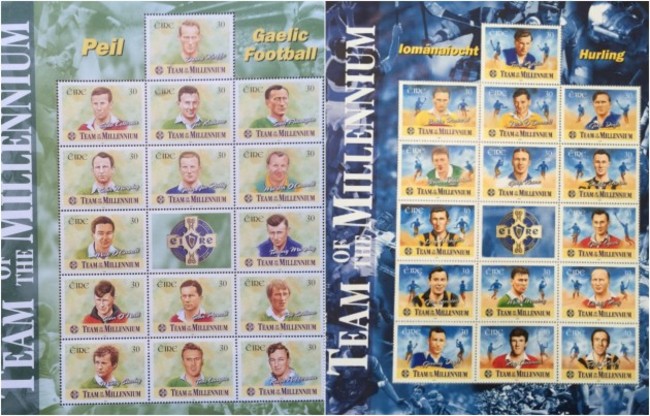
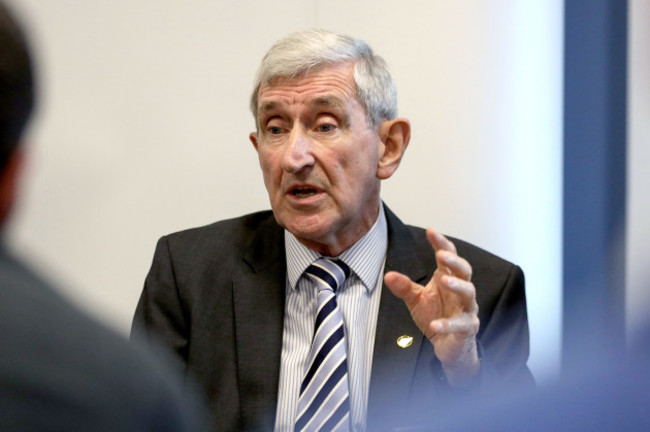
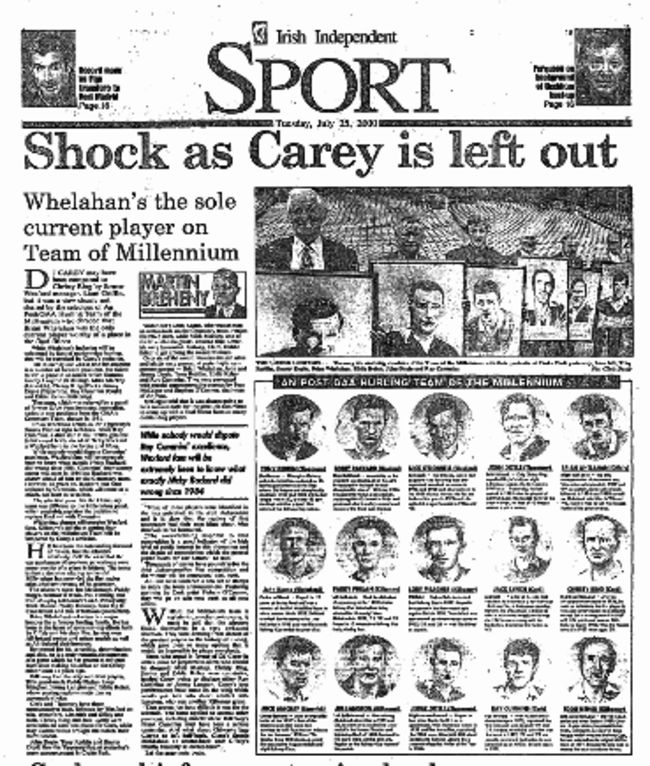
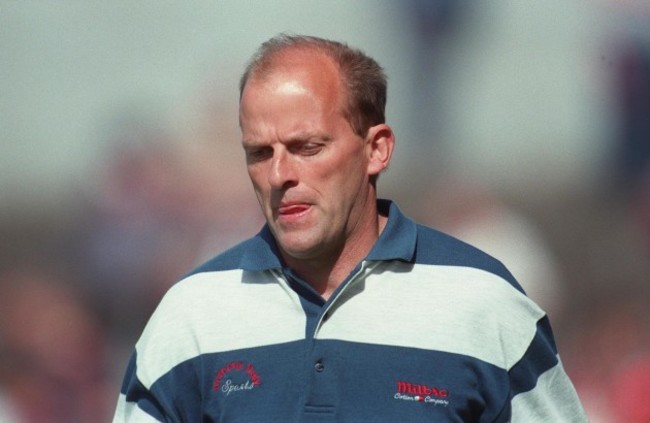
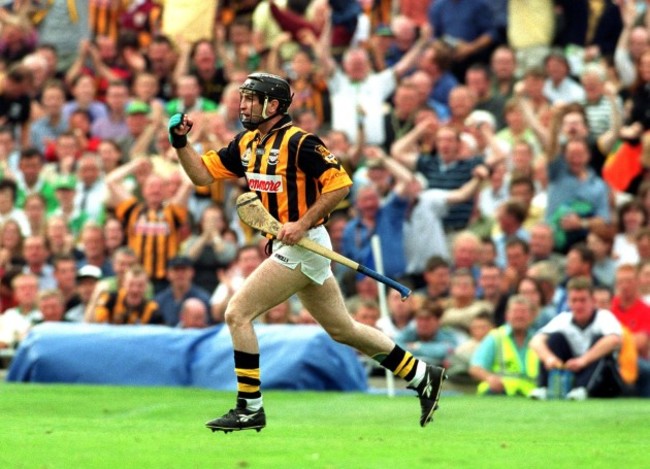
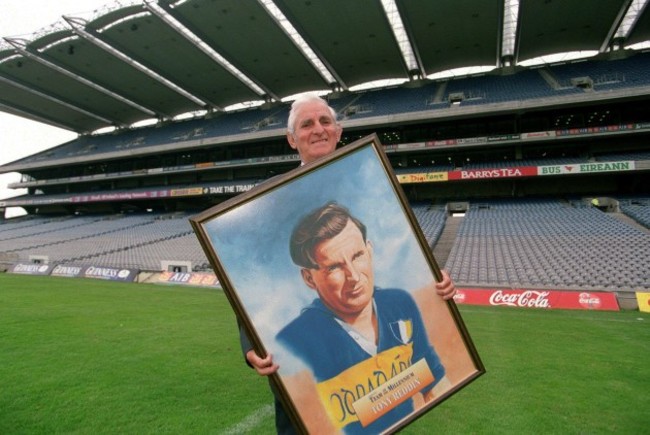



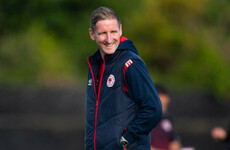
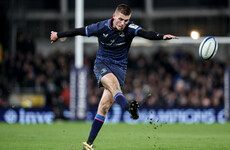
What a non competitive event the Leinster championship is. That’s hardly Dublin’s fault though.
Yea…bit of a joke really…a very well supported event, but I cant see the point of this format. Surely an all Ireland league in two divisions would be best
Maybe they should play their games somewhere other than their own back yard for a change. Give the rest of the Provence a chance. Advantage the dubs all the time, – the only way they can win.
That is a losers attitude
Wow that’s an original post.
Well if that’s what all the other counties in Leinster want tell their Provincial Board members to vote for it happening rather than against it. County Boards want money ergo if they get the chance they all want the Dubs in Croke Park.
Niall- Take yourself back to the 2010 Leinster final you absolute GIMP!!
the village is missing it’s idiot
We would love to travel but powers to be want us there as make more money for them
I thought Luis Suarez was banned from all football ? Gaelic football obviously not included.
Lower.
42 like minded fools
Congats Dublin total football, a breath of fresh air……..as for the Ulster final beggars belief how people still watch puke football.
Youre a gob shyte.
Ya,have admit FairPlay to Dublin they play “pure football” as it should be played unlike northern boys with cynical fouling diving pulling dragging etc, ,it’s just some Dublin arrogant fans that I don’t lik but the team are quality!
#kerryman
Fair play Colm, those fans are a minority thankfully.
This Dublin fan fears Kerry. If we meet again and get half the quality of game we got last year all in for a treat.
Watch the replay Tony. It’s a kick in the B****x he deserved.
Another baseless and false accusation against a Dublin player. But we’re well used to it by now. The sourest of sour grapes from Meath IMHO.
Provincial championships are holding back Gaelic football….Leinster,Connacht and to a slightly lesser extent Munster are processions every summer.Ulster is ultra competitive but is dominated by visually poor football.Unless the GAA gain the balls to overhaul the whole championship,it’ll suffer irrepairable damage……
Dunno about irreparable damage but agree the whole season structure is holding football & hurling back
How is Munster less of a precession than Connacht? Same two counties have won Munster since 1993. All Connacht counties bar London and New York have Connacht titles won since then. Might not have won all Ireland’s as many as kerry in that time but there’s still some competition there. I’ve funny feeling people who come on here whinging about Connacht don’t bother to watch or read up on its history.
Get rid of the provincials and you might as well forget about football in weak counties. It’s 20 years on Friday next since Leitrim won the Connacht title. Counties like Leitrim have to genuinely have something of worth to aim for; a B championship won’t cut it alone. The qualifier system does have merit, perhaps it needs to be enhanced with more games (like the hurling). If there is to be a B championship the winners must have an entry back into the later stage of the championship (call it a wild card or what not).
Yep cheers RI & Shane,Dublin are serious outfit with real depth & quality in squad but,they play total football as it should be played with pace skill & zero negative football,I do believe if Kerry meet Dublin again it would be another classic but,still some good teams out there I.e. Mayo,I can’t see cork being as bad again as they wer against us,I feel we played very well & they just flopped on day!!
Just want see quality football!!
Agreed Colm, was shocked at your demolition job of cork to be honest, in term of raw talent i think cork are as good as anyone.
It was painful watching meath players having to go through that towards the end. This particular result doesn’t reflect the pretty good job that mick o dowd has done at meath. Hopefully they can regroup and put in a good performance in their next game.
I’ll say this, even if it is true nothing will be done about it.
Why will nothing be done about it?
Nobody can question the fact that dublin have a talented squad but they have so much more advantages than any other county. Massive pool of players to pick from, massive sponsorship money which other counties dont receive, refs seem oblivious to their constant fouling and the biggest advantage is never having to play an away game outside of Croke park. Its so corrupt and unfair. They should never get to play in Croker until the semi final like every other county.
Yeah who’d want fans to be able to actually watch matches we should fill parnell park and tell everyone else to feck off
I love the way that none of your points were ever issues until Dublin started winning.
Yeah, no games in croke park until the all-ireland semi final. Unless you’re Meath, Kildare, Laois, Louth, or wexford. But they don’t count for the chip on shoulder brigade
I have complained about Dublin playing all year in Croker for years not just since they started winning, its a massive advantage but the narrow minded fans dont see it. Disregarding fans, who else is it fair to? Honest question.
If playing in Croke Park was such an advantage to Dublin, why have they only won 3 All-Irelands in 20 years? Dublin have won National Leagues in the last few years which means winning in other grounds up and down the country. The team is the best in the country because of their ability, athleticism and drive. Not because of Croke Park. As for refs giving everything to Dublin? Whinging at best.
noted Dublin fan john doyle of kildare in an interview with the Irish independent last year dismissed the notion of Dublin having home advantage – said if that influenced you then you had no place playing at all. besides, meath and kildare since the new croke park opened have played almost as many and havent had a problem winning.
in relation to the massive sponsorship – the aig deal is less than the vodafone one and covers more teams, and people seem to overlook that the county board needed a big sponsor to cover the thousands of teams and grades including all the juvenile in the county – the massive playing population some seem to see as a problem. i would have thought true gaa fans would welcome a big playing population in Dublin but time and time again you see comments that Dublin having people playing is an unfair advantage.
Dublin always had the biggest sponsorship with arnotts and nobody minded, Dublin played their league games in croke park for decades nobody minded, Dublin played all their big matches in the redeveloped croke park nobody minded.
until last September.
you want Dublin out of croke park? give out to the leinster council, they tell Dublin where to play, theyre based in that Dublin stronghold of portlaoise. since provincial championship money goes to all the counties and they need something to show the boxes and term ticket holders im sure theyll listen keenly to you.
but sure, haters gotta hate.
tom stamp absolutely on the money
Andrew… Did you listen to johnny Doyle on the Sunday game last night? He has played far more championship games in Croker than in newbridge. That goes for Meath, Laois etc. Your argument is null and void. Tell your county boards to stop voting to keep the dubs in HQ. Also half the population of Dublin are culchies and not available for selection. Also far more sports played in the capital than in smaller towns and villages.
Well Im a Limerick man so Dublin football does not affect me in any way shape or form. Im not just talking about Leinster teams, what about the likes of Cork or Galway etc, the teams who dont play there every year. Is it really fair to them to play Dublin there when the dubs have played maybe 5 games there that year before the other team have played there. Its an intimidating place for most teams yet alone playing a team who play all their games there and are used to it. I understand its not Dublins fault and the gaa will never change it over the money. My example would be to have Kerry play every game in Kilarney during the year and then meeting the dubs in the final down there. There would be war from Dublin and you know it. Its not fair.
Never heard the great Meath manager Sean Boylan whinge,grow up O’Dowd.
A proud Meath man my team should be ashamed of themselves don’t start blaming the dubs the only thing I’d say against the dubs was they should of won by 30points that game will of done them no good the mad thing is well win next Saturday
David i have been in the company of meath supporters at match times going back to the mid 80s and they would have no time for some of the comments about Dublin in croke park – they would dismiss it as the sort of stuff they would expect from small counties not meath. not that these types would cross the road to attend a match or put down the keyboard.
The leinster championship is now worse than the old ulster hurling, beyond embarrassing.
Come on Sean it’s not dat bad
It’s like watching ground hog day, with out at least two laughs… totally predictable totally boring.
I’m not a Dublin or Meath fan but am I alone in thinking that Dublin had home advantage today? I’m not saying it would have made any difference, but when was the last time Dublin played a championship match outside Croke Park? I thought Parnell Park was their home ground!
Where else in Leinster would you fit 62,000 people? Not all of them Dubs either by the way.
It is, so that means we play nearly every game away, great attempt at making your point.
Dublin win? So what
bitter and twisted sad really
Who asked you to leave Dublin?
Do they not serve finger food in Coppers anymore?
Dublins sheer professionalism is beginning to strike fear into us Kerrymen down south….
Don’t expect anything from G.A.A as it’s rubbish at protecting it’s players.
Says the man with the crest of the club who protected the racist Suarez.
@derek…. You absolute pinhead ! Better to look stupid than speak and remove all doubt!
If dublin play outside croke park the gaa lose a fortune and every county except dublin lose. 20,000 in parnell park with every cent going to dublin versus 60,00 in croker with the money going to central council?
parnell park capacity in 9500 or thereabouts. kildare county board gave out last year that its not fair that Dublin dont have a mountain of debt like they do and should be forced to build a 40-60k ground on a greenfield site to get that debt. same county board who are so worried about Dublin home advantage they switched their home league game against them last year to . . . . . . croke park.
No coverage of the Ulster Final?
Fack sake
Who gives one?
Ok, Fitzgerald park and the Gaelic grounds and a spattering of county grounds added up would possibly accommodate a crowd for a Game involving Dublin late in the championship . Perhaps a round robin championship involving the Dublin crowd moving systematically around grounds in the south-west of the country playing the Leinster championship is the answer, but is it plausible?